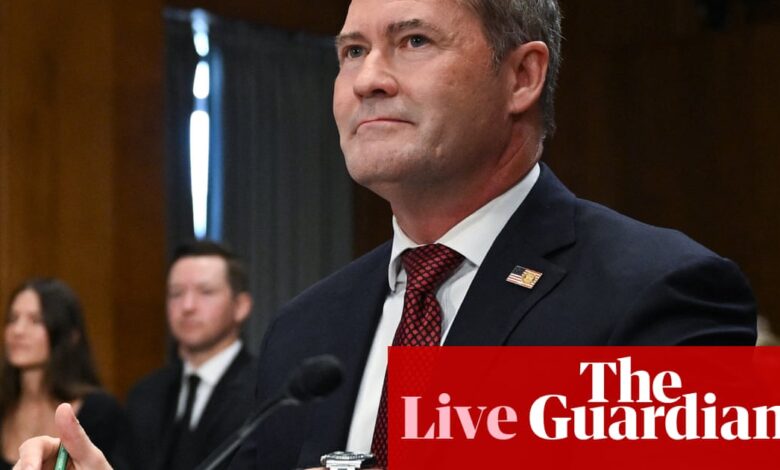Trump’s ex-national security adviser defends use of Signal months after group chat leak – live updates | Trump administration

Summary: Mike Waltz’s Senate confirmation hearing
In case you’re just catching up, here are some of the top lines from Mike Waltz’s Senate confirmation hearing to become the US ambassador to the United Nations:
-
Waltz was critical of the UN’s approach to China and “antisemitism” in his opening remarks. He said the UN had drifted from its original peacemaking goals and should return to its founding principles – “peacemaking, not nation-building”.
-
Waltz also pledged to “make the UN great again,” echoing Trump’s message for revamping America.
-
It took over an hour before the Signal group chat leak was mentioned. The leak, which occurred when Waltz was national security adviser and inadvertently added an Atlantic journalist into a group chat about US strikes on Yemen, led to his removal from that role in May and current nomination as ambassador to the UN.
-
Waltz said using Signal was “not only authorized, it was recommended” for government and personal devices. He also repeatedly claimed no classified information was disclosed.
-
Democratic senators Chris Coons, Tim Kaine and Cory Booker were the ones to press Waltz about Signalgate. Booker in particular excoriated Waltz for “cowardice” and acting in a manner that he said is “disqualifying” for this position.
-
Republican senators were far less critical of Trump’s nominee, instead confirming that his thoughts and decision-making would align with the president’s Maga agenda.
-
Waltz stressed that the Trump administration’s diplomatic strategy would be focused on cutting costs to what he called “waste, fraud and abuse that are endemic to the UN system.”
-
Democratic senator Jacky Rosen then cited that strategy when asking whether Waltz was still on White House payroll, despite being removed from his former role months ago, and said that could be perceived as a waste of taxpayer dollars.
Key events
Waltz denounces UN global reports that examined US domestic policy
Earlier in the hearing, the Associated Press reported that Mike Waltz stressed that the Trump administration’s diplomatic strategy would be focused on cutting costs to what he called “waste, fraud and abuse that are endemic to the UN system”.
“It’s worth remembering, despite the cuts, the US is by far the most generous nation in the world,” said Waltz, responding to concerns that the administration’s cuts to global programs hurt US influence.
Waltz added that some UN-funded research and projects were anti-American and received input from some UN members whom the administration considers adversaries.
“The UN’s radical politicization, such reports as ‘Stolen Native American Land’ reports and investigations, called the ‘George Floyd mechanism’, labeling American police and America systemically racist with input from countries like Cuba and Venezuela, is unacceptable,” said Waltz.
Mike Waltz’s hearing has officially concluded.
Democratic senator Jacky Rosen opened her line of questioning by asking Mike Waltz if is he still on White House payroll, as the Associated Press reported earlier.
From the AP: Waltz, whose Florida House seat was filled during a special election earlier this year, has spent the last few months on the White House payroll despite being removed as national security adviser. The latest list of White House salaries, current as of July 1, includes Waltz earning an annual salary of $195,200.
“I was not fired, the president never said that,” Waltz said in response. “I was kept on as an adviser.”
Rosen asked him to explain because he was removed as the national security adviser. Waltz went on to call the reporting “fake news”, which the senator was in no mood to entertain.
Booker slams Waltz for ‘profound cowardice’ for behavior after Signal group chat leak
In Cory Booker’s time to question Mike Waltz, he also took the opportunity to go after the nominee for his actions during and after the Signal group chat leak.
The New Jersey senator said Waltz went after the Atlantic journalist, whom Waltz accidentally added to the Signal group chat, and was disappointed by the fact that the then national security adviser could not own up to making a mistake.
“That’s not leadership when you blame people who tell the truth,” the senator said.
Booker did not hold back his critique of Waltz:
“In a moment when our national security was clearly compromised, you denied, you deflected, and then you demeaned and degraded those people who objectively told the truth and criticized your actions. Smearing people, attacking folks, singling them out just further compounds what I think is disqualifying about you for this position. It also to me just shows profound cowardice.”
As Mike Waltz testifies in Washington, Donald Trump has been quite active on social media this morning on an array of topics, including Adam Schiff, the Fed and a new digital assets bill.
After it was reported that the inflation rate was higher in June as Trump’s tariffs start to show in pricing, the president implored the Federal Reserve to “cut Rates by 3 Points. Very Low Inflation. One Trillion Dollars a year would be saved!!!”
And apparently it’s crypto week, according to his latest post on Truth Social. Trump claims the House will soon vote on a digital assets bill.
The GENIUS Act is going to put our Great Nation lightyears ahead of China, Europe, and all others, who are trying endlessly to catch up, but they just can’t do it. Digital Assets are the FUTURE, and we are leading by a lot! Get the first Vote done this afternoon (ALL REPUBLICANS SHOULD VOTE YES!).
Democratic senator Tim Kaine also brought up Signal during his time to question Mike Waltz.
The former national security adviser again claimed that no classified information was shared. Waltz cited testimony from the defense secretary, Pete Hegseth, claiming the same assessment of their Signal group chat.
“I’m sure Secretary Hegseth says he didn’t share any classified information but the fact of the matter is there are two investigations going on at the Pentagon precisely to determine in an objective and independent way whether classified information was shared,” Kaine said.
Waltz says no classified information was shared during Signalgate
Finally, Mike Waltz is asked by Democratic senator Chris Coons whether he was investigated for his disclosure of sensitive operational information on Signal and his expansion of the group chat to (mistakenly) include a journalist.
Waltz says that use of Signal was “not only authorized, it was recommended” for government and personal devices.
Pressed to clarify whether Signal was recommended for disclosure of sensitive military information, Waltz says there was no classified information disclosed.
Pressed again on whether or not he was investigated, Waltz says the White House conducted an investigation and, to his understanding, the Department of Defense was still conducting one.
Asked if any disciplinary action was taken, Waltz says no.
Asked if he spoke to the US defense secretary, Pete Hegseth, about his decision to share details of an imminent military strike, Waltz says they only spoke about the “highly successful mission”.
Coons says he was hoping to hear some level of regret from Waltz about sharing sensitive information on a commercially available app, to which Waltz insists again that no classified information was shared.
Just an observation that we’re an hour into this hearing and the Signal group chat leak hasn’t come up yet.
If confirmed as ambassador, Mike Waltz would arrive at the United Nations at a moment of great change, writes the Associated Press. The world body is reeling from Trump’s decision to slash foreign assistance – affecting its humanitarian aid agencies – and it anticipates US funding cuts to the UN annual budget.
Under an “America first” foreign policy realignment, the White House – in line with the remarks we’ve just heard from Waltz at the hearing – has asserted that “some of the UN’s agencies and bodies have drifted” from their founding mission and “act contrary to the interests of the United States while attacking our allies and propagating antisemitism”.
With the US being the largest UN donor, cutting American funding to the UN budget would greatly impair operations.
Facing financial instability, the UN has spent months shedding jobs and consolidating projects while beginning to tackle long-delayed reforms. It is also facing growing frustration over what critics describe as a lack of efficiency and power in delivering on its mandate to end conflict and prevent wars.
John Bolton, a former US ambassador to the UN who was also national security adviser during Trump’s first term, was critical of the current state of the UN. “It’s probably in the worst shape it’s been in since it was founded,” Bolton, now an outspoken Trump critic, recently told the AP.
In his opening remarks, Mike Waltz was critical of the United Nations’ approach to China and what he called “antisemitism” at the organization.
He said the UN had drifted from its original peacemaking goals and should return to its founding principles – “peacemaking, not nation-building”. Waltz added:
I’m confident under this president’s leadership, we can continue to spread peace and prosperity, and I’m confident we can make the UN great again.
“Countering China, absolutely, Senator Shaheen, is critical,” Waltz said. If confirmed, he said, he would work with the US secretary of state, Marco Rubio (who also replaced him as national security adviser), to challenge China’s growing influence at the UN.
He also highlighted the large number of UN resolutions against Israel compared with other countries, without offering any context as to why that might be.
True to her comments in my last post, the ranking member on the Senate foreign relations committee, Jeanne Shaheen, focused her opening remarks at Mike Waltz’s confirmation hearing on critiquing the US’s retreat from its role on the global stage, highlighting the Trump administration’s slashing of budget and staff related to international relations. When the US pulls back, China benefits, she said.
They continue making long-term investments at the United Nations and international organizations, not only through contributions, but by placing more Chinese nationals in key roles. Mr Waltz, I urge you to take this threat seriously. I know you do.
Mike Waltz testifies at Senate confirmation hearing on nomination as UN ambassador
Former national security adviser Mike Waltz (remember him?) is due to have his confirmation hearing before the Senate foreign relations committee shortly, giving lawmakers their first opportunity to publicly question him over the Signalgate controversy – which saw him inadvertently add a journalist to a high-level Signal group chat about US military strikes in Yemen.
Trump removed Waltz from his role as national security adviser in May, weeks after the scandal, and nominated him to the position of United Nations ambassador. Waltz had actually been on thin ice for weeks before Signalgate in large part due to strained working relationships in the White House, but he had also found himself under pressure for being seen as a war hawk and at odds with Trump’s “America first” agenda.
The demoted Waltz, who has been meeting with senators on Capitol Hill in recent days, will appear before the committee today alongside John Arrigo and Christine Toretti, two other Trump nominees for ambassadorships to Portugal and Sweden respectively. He is largely expected to be confirmed unless anything major comes up – and get a second go in the Trump administration.
The top Democrat on the committee, Jeanne Shaheen, told NBC News she is “sure” Signalgate will come up, “but what I want to know from Mr Waltz is whether he supports the UN, continued American presence at the United Nations, how he intends to make that case, and what he sees as the role of our UN ambassador”.
I’ll bring you any key lines from the hearing here.




